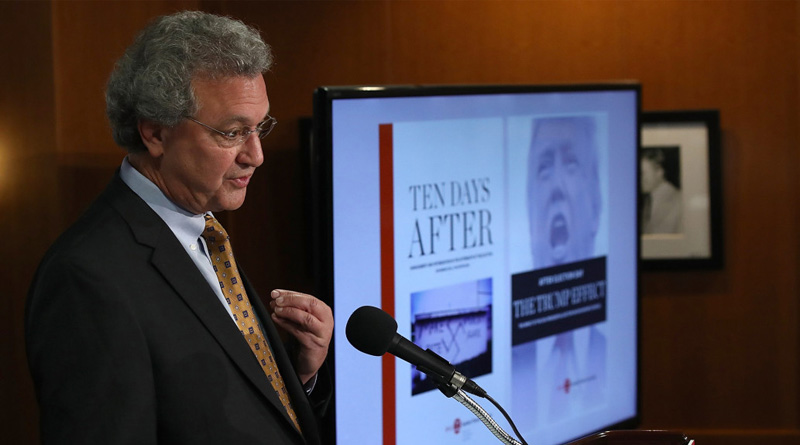What Happened to the Southern Poverty Law Center?
For nearly 50 years, the Southern Poverty Law Center has been a fixture of the Montgomery cityscape. The current iteration of the SPLC’s headquarters is two blocks from the Alabama State Capitol, where Martin Luther King Jr. gave a speech at the conclusion of the 1965 civil rights march from Selma to Montgomery.
Ironically, it is also blocks away from the First White House of the Confederacy, where Jefferson Davis lived at the beginning of the Civil War. Another famous landmark in its vicinity is the Dexter Avenue Baptist Church, where King organized the Montgomery Bus Boycott after the arrest of Rosa Parks.
The headquarters of the SPLC sticks out like a sore thumb among these buildings. The building, which more closely resembles an Austal USA littoral combat ship than anything else in downtown Montgomery, sits at the corner of Washington Avenue and Hull Street.
Initially, the SPLC had noble goals. Founded in 1971, it served as a law firm that fought against racial discrimination and poverty. By the end of that decade, it had successfully implemented a system of combating the Ku Klux Klan by targeting the organization’s chapters with civil litigation and forcing them into bankruptcy.
However, by the mid-1980s, the SPLC took on a different role. Instead of focusing solely on racism and racist organizations, it broadened its mission to take on all forms of so-called right-wing extremism.
This adjustment proved very lucrative for the SPLC, with its founder, Morris Dees, still at the helm. In a 1994 exposé by The Montgomery Advertiser, it was described as a “money machine” by its critics. At the time, the organization had hoarded nearly $52 million in reserves. Those same critics accused the organization of exaggerating claims of “hate” to secure this fundraising.
Since then, the SPLC has continued to make waves. One of its more notable endeavors was teaming up with the American Civil Liberties Union in Glassroth v. Moore in 2002 to force then Alabama Supreme Court Chief Justice Roy Moore to remove a monument displaying the Ten Commandments from the rotunda of the Alabama Judicial Building.
Moore refused and he was removed from office, along with that monument.
Now with an operating budget of $45 million and an endowment in excess of $300 million, the SPLC is still at it, willing to label any organization that does not adhere to a strict interpretation of its left-leaning values as a “hate group.”
This is not without consequence.
Some news organizations regard the SPLC as the definitive authority on hate groups. In recent years, its definition of what constitutes a hate group has dramatically expanded to include groups that oppose same-sex marriage, a belief held by many religious organizations.
Last week, Attorney General Jeff Sessions gave a speech to what ABC News defined as “an alleged hate group” based on the SPLC’s designation.
Sessions’ speech was to a group called the Alliance Defending Freedom, a group that lists “religious freedom, sanctity of life, and marriage and family” as its core issues and defines its mission “as funding cases, training attorneys and successfully advocating for freedom” in the name of those causes.
Where ABC News took particular issue with Sessions’ address to this group is that the Department of Justice was not releasing his remarks to the media. So as you might imagine, ABC News’ website posted a story headlined “Jeff Sessions addresses ‘anti-LGBT hate group,’ but DOJ won’t release his remarks.”
For them, this was probably was a twofer. Not only do they get to work in an angle of questionable behavior committed by one of President Donald Trump’s Cabinet members, but also in the name of “anti-LGBT hate,” which the SPLC and ABC News apparently define as opposing same-sex marriage.
The ABC News report, bylined by Pete Madden and Erin Galloway, justified naming the ADF a “hate group” with a link to the Southern Poverty Law Center’s website.
The ADF, along with 916 other organizations, are deemed by the SPLC to be “hate groups.” The SPLC pinpoints these groups on its website’s “hate map.” Twenty-seven of these groups are in Alabama, ranging from chapters of the KKK to the Nation of Islam.
OK, it is arguably valid to classify white and black separatist groups as “hate groups. But 52 of those 917 organizations fall under the SPLC’s newest definition of hate group, which it deems to be “anti-LGBT” groups.
In addition to the ADF, included among those are nonthreatening organizations such as Gainesville, Florida’s, American College of Pediatricians and politically active groups such as the Family Research Council in Washington, D.C.
When did a policy disagreement about the government’s endorsement of same-sex marriage become “hatred” that rises to a level of racism? Apparently when it became lucrative. In a fundraising pitch from May, the SPLC offered a list of anti-LGBT incidents (some of which it tied to Trump’s election victory).
One conclusion that could be drawn is that the SPLC regards LGBT issues as a fundraising cash cow. And, by extension, deeming groups that oppose same-sex marriage on religious grounds as hate groups is fundamental to that effort.
When a group like the Southern Poverty Law Center, with arguably undeserved credibility on defining what is and what isn’t a hate group, starts broadening its definition of hate, it marginalizes its own abilities to combat hate.
The definition of “hate” becomes watered down and people stop taking the claims of hate seriously. Suddenly, being branded as a “hate group,” even if it is warranted, loses its effectiveness.


If your against anything you are a hater. Even God hates us if we sin. Shall i jump in lava and save God the trouble. We should stand against any group that labels us damned. and assumes to have legal authority. Our Senators and the like. owe all protection for our 1st 2nd amendments and voting rights. Freedom of association as well. Freedom to fight back on fair legal grounds.